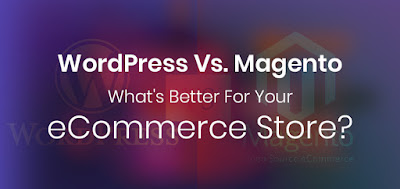WordPress Vs. Magento: What's Better For Your eCommerce Store?
WordPress and Magento both are content management systems and both of these are two of the most popular frameworks in the world right now. CMS are handy platforms that are used to create online websites. They provide tools that let the owners build websites suited to their personal or business needs.
WordPress and Magento are certainly among the most popular. Now, at first glance, many misunderstand that both WordPress and Magento are pretty similar, but that's not the truth.
Both of these platforms were launched with a perspective in mind. Both of these platforms were designed to cater to some specific kinds of websites. So, when it comes to finding which CMS is right for you, you decide this by comparing both of these websites and more importantly, what kind of role your website is going to perform.
Now let us understand in brief what these platforms are and what do they do.
WordPress was originally designed as a blogging platform and since then it has climbed ladders of success and exploded in its popularity and versatility. WordPress is one of the most famous frameworks currently. It is able to produce literally any kind of website. WordPress is considered to give a user-friendly experience, website customization being one of its most impressive features. WordPress is easy to use and has a lot of plugins available and above all, it's a paradise for bloggers.
If your website's goal is to sell your products online through an eCommerce website, Magento should be your choice. Magento is an open-source platform which has become a favorite for online users for a long time now. Magento ranks 4th in the most famous CMS frameworks in the world. Magento offers many high-quality extensions for the overall development of the website. Magento offers a high level of customization and functionality that provides the merchants with the flexibility to set up online stores according to their business needs.
Now we will discuss what we are here for. We will compare both of these CMS on the basis of their features so that you can decide which CMS you should go with for your next project.
WordPress and Magento are certainly among the most popular. Now, at first glance, many misunderstand that both WordPress and Magento are pretty similar, but that's not the truth.
Both of these platforms were launched with a perspective in mind. Both of these platforms were designed to cater to some specific kinds of websites. So, when it comes to finding which CMS is right for you, you decide this by comparing both of these websites and more importantly, what kind of role your website is going to perform.
Now let us understand in brief what these platforms are and what do they do.
Let us first discuss WordPress
WordPress was originally designed as a blogging platform and since then it has climbed ladders of success and exploded in its popularity and versatility. WordPress is one of the most famous frameworks currently. It is able to produce literally any kind of website. WordPress is considered to give a user-friendly experience, website customization being one of its most impressive features. WordPress is easy to use and has a lot of plugins available and above all, it's a paradise for bloggers.
Let us now come to Magento, an eCommerce powerhouse
If your website's goal is to sell your products online through an eCommerce website, Magento should be your choice. Magento is an open-source platform which has become a favorite for online users for a long time now. Magento ranks 4th in the most famous CMS frameworks in the world. Magento offers many high-quality extensions for the overall development of the website. Magento offers a high level of customization and functionality that provides the merchants with the flexibility to set up online stores according to their business needs.
Now we will discuss what we are here for. We will compare both of these CMS on the basis of their features so that you can decide which CMS you should go with for your next project.
1. Ease of Use
As long as the easy installation is concerned, WordPress installation is simple and very easy as it can be installed in a few minutes. WordPress has a simple user interface with the menus to utilize all the WordPress features.
Installation of Magento site is complicated when compared to WordPress installation. There are a lot of challenges will be faced by users, especially if the user is a beginner, he might face some problems while using its features.
2. Security
Security is a major concern for the overall performance of any eCommerce website. Due to its popularity, WordPress gets a lot of press on this aspect. However, the core code for both the CMS is highly secure.
Both of these platforms keep launching many security improvements. The security comes with many add-ons, themes, and plugins you choose as well as how well you are able to manage your server security.
Security is yet another reason to choose a managed hosting solution, as you can have complete flexibility and freedom without worrying about any security flaws.
3. SEO Friendliness
Both WordPress and Magento ship with acceptable SEO features, but they can be improved with a few tweaks and plugins.
For WordPress, it is important to use clean themes and install a plugin such as Yoast SEO to manage important page details such as custom page titles and meta descriptions.
Similarly, while using Magento, its important to use a well-coded theme. Magento is not usually built with content marketing in mind, you may find that it takes a little more efforts to tidy up your SEO. One of the most overlooked aspects of Magento is to add title and alt text to each and every image which can significantly increase traffic.
4. Product Management
If you are looking for a perfect eCommerce store, better product management must be there on your list. WooCommerce offers options for both physical and digital products for product management. In WooCommerce, setting up new items is remarkably simple, especially when you are familiar with WordPress.
Magento, on the other hand, offers many features that WooCommerce doesn't without purchasing additional extensions. It supports product reviews, wishes lists and product personalization and, many other advanced features also.
Overall, WooCommerce is the better choice for those who don't want advanced features in their stores. It is especially important for small ventures. If you want to expand it, you can do it using extensions.
5. Flexibility
WordPress has a number of plugins, some of them are free/inbuilt whereas some of them are paid ones to help the users convert a simple website into a powerful online store for a successful online eCommerce store.
On the other hand, Magento only focuses on eCommerce features, it cannot match WordPress in terms of flexibility. But a powerful eCommerce store a be built by using Magento.
Even though a successful website or store can be built with Magento but as long as flexibility is concerned, WordPress clearly is the winner.
6. Price
Budget is one of the most important points to compare both of these platforms. As discussed before, WooCommerce is completely free, whereas Magento is not completely free as it only offers a free community version alongside multiple premium services.
However, it's entirely possible to get an online store with both platforms. How much you spend on your store depends largely on which hosting provider you choose.
Both of these platforms are free and it can cost you much if you use too many extensions so after all, how you run your website decides how much you will have to spend.
7. Functionality
As Magento has more advanced features, building a multivendor marketplace becomes more convenient with the advanced features of Magento. Magento provides more versatility and a professional look to your website in order to sell the products.
On the other hand, WordPress is a more suitable option for blogging and for an informational website. An eCommerce website that offers company services can be built with WordPress with the help of various plugins.
We repeat again if you are a beginner and want to start with a small budget, WordPress is a good option but if you can afford to build a big and professional online website, you better go with Magento.
Conclusion
Considering the various features and functions of both of these platforms, you must be able to decide which platform you should go with. After going through this blog, we hope you have figured out its pros and cons for the development of your own eCommerce website.
You must take the right decision after analyzing both of these platforms and knowing what will be best for your online store. We hope this blog proved to be helpful for you and it helps you make the right decision of whether to go for WordPress or Magento.



Your blog is very informative and gracefully. Your guideline is very good. Thank you Top Web Design Company in Bangalore | Web Development Company in Bangalore | Website Designers in Bangalore | Website Design in Bangalore
ReplyDeleteNice post. We are Gold Solution Partner with nopCommerce.com. We employ highly qualified, nopCommerce certified developers, and have experience creating more than 32 sites with nopCommerce.
ReplyDelete